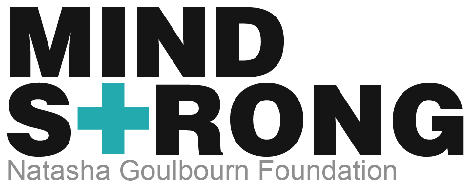Our Inspiration
“Knowing about depression can decrease the risk of suicide…”
The Natasha Goulbourn Foundation (NGF) started embarking in its mission to promote awareness and understanding for Depression as a medical condition when it was founded in 2007. Through a series of local and international lectures of forums, aided with media mileage on TV, print and radio, people have started to become aware of what depression is all about, and how at its worst, it can lead to suicide.
NGF saw the need to deliver the information and education drive at a much faster and wider scale. In this, two programs were developed. The first being the development of a curriculum for the INFORMATION AND CRISIS INTERVENTION CENTER (ICIC). The curriculum was co-authored by Dr. Cornelio Banaag, Dr. Ma. Lourdes A. Carandang, Dr. Eleanor Ronquillo and Dr. Ricardo Soler who are leading mental health professionals. Information and Crisis Intervention Centers are centers of communication where one-to-one telephone exchanges assist and support callers in crisis due to depression or suicide issues and/or callers who are not necessarily in immediate crisis but may need help to prevent a crisis from occurring or to de-escalate an ongoing one. ICICs make it possible for people in need to quickly connect on person-to-person basis with qualified, trained and certified Responders who assist callers through established protocols.
The second is the continued observance of WORLD SUICIDE PREVENTION (SuPre) DAY. First initiated by the International Association for Suicide Prevention (IASP) and with the participation of the World Health Organization (WHO), World Suicide Prevention Day is observed every September 10 as a call to support programs for suicide prevention, remember lost loved ones and support survivors of suicide. Recently, NGF has partnered with the Philippine Psychiatric Association (PPA) and several schools nationwide to spread the message across.
As its awareness campaign gets broader and more people come for assistance to seek treatment for themselves or their love ones suspected of suffering from depression, NGF realized its limitations and saw the urgent need to forge partnership with individuals, civic groups, as well as other government and non-government organizations in order to direct the public where to undergo diagnosis, treatment and therapy for patients suffering from depression.
NGF Programs and Services
- Education and Advocacy Programs
Community Education. With the help of mental health care providers and volunteers, NGF visits communities to give lectures, seminars and events to raise awareness about depression – identification, management and prevention. These are done through the following:
Colleges and universities, usually in partnerships with the Department of Psychology and/or Department of Student Affairs;
Public schools thru the sponsorship of the LGU or Corporate Social Responsibility initiatives of private organizations;
Church-based communities; and
Communities with the large concentration of families of OFW (also known as the home front)
Multi-media Education
NGF provides information about depression, especially management and prevention through its website and other social networking sites. It also uses television, radio and TV to for its advocacy campaign.
- COMMUNITY EMPOWERMENT
Following the WHO recommendation for the delivery of community-based mental health care program, NGF provides trainings and workshops to teach youth leaders, parents, teachers and community leaders to become “paracounselors”. Participants are trained to do psychotherapy and to identify when intervention of a professional mental health care professional is needed and how to facilitate referrals.
- SERVICE NETWORKING
NGF continuously forges partnerships with like-minded groups and individuals in order to provide diagnosis, management and preventive services for depression.
Through partnerships with other government and non-government organizations, private groups and individuals, NGF makes counseling services available to individuals and families through phone, live radio and person-to-person (individual and group).
Areas of Work
Information and Crisis Intervention Center (ICIC) Curriculum
NGF has created a curriculum (authored by Dr. Cornelio Banaag, Dr. Ma. Lourdes A. Carandang, Dr. Eleanor Ronquillo and Dr. Ricardo Soler) that trains crisis responders to address emergent suicidal and/or severely depressed callers. Eventually, this curriculum will be used to train teachers of public and private schools to recognize the symptoms of depression and the appropriate response for a child who is deemed to be at risk.
Public Awareness Campaign
Through the use of posters, radios, televisions, dailies and newspapers, NGF will tirelessly inform the public on how to prevent, recognize and treat depression.
MINDSTRONG activities
This new campaign we are launching focuses on MENTAL FITNESS TO FIGHT DEPRESSION. It is a philosophy of holistic empowerment- and encourages mental health through proper nutrition and exercise.
Counseling Wellness/Wholeness Rooms
We aim to set up these rooms within established health centers or local government hospitals in order to address the increasing number of depressed cases in the Philippines. We are currently working with different psychological associations and groups to create a curriculum that will effectively train the practitioners and provide a guideline to be used for risk assessments.
INFORMATION AND CRISIS INTERVENTION CENTER (ICIC) CURRICULUM
RATIONALE
Research on depression and suicide rates in the Philippines are sorely lacking. Many cases of suicide go unreported due to lack of information and the shame that accompanies the act. Having suicidal ideations is seen as a weakness and as a result, many people attempt because there is no help available to them.
It is with this in mind that the Natasha Goulbourn Foundation along with Dr. Cornelio Banaag, Dr. Ma. Lourdes A. Carandang, Dr. Eleanor Ronquillo and Dr .Ricardo Soler have authored a curriculum that will train responders to handle a suicide hotline for Filipinos.
NEED
Making crisis intervention readily available to those in need
Eliminating hurdles to the proper management and treatment of depression through the empowerment of sufferers, their affected relatives and friends as well as their community through awareness and education
Collaborating and partnering with support networks to save lives
ROLE
The Foundation refers to such centers under the general term Information and Crisis Intervention Centers (ICICs), which make it possible for people who are depressed or suicidal, or those who are related or concerned with individuals with these conditions, to quickly connect via telephone to qualified, trained and certified Responders who will assist callers through established protocols.
FUNCTIONS
ICICs provide services as an immediate response to callers. On-site advocates, termed Responders, man the crisis-lines around the clock 24 hours, seven days a week.
ICIC Responders, who inherently have the proper attitudes and are trained to have the skills and knowledge to qualify them to do so, provide depression information and crisis counseling to callers.
Focus on the Filipino OFW Family
Based on studies of the dynamics of depression in relation to modern Philippine Society, the Natasha Goulbourn Foundation realized that the OFW group is one of those at the highest risk of suffering from depression – not just for the workers themselves, but also for the families they left behind.
Migration brings about great disturbance on family functionality. Fueled by economic motives, this involuntary family separation results in disruption of family structure and leads to dysfunctional coping on both sides of the ocean – both for the migrant worker, and for the family that was left behind.
While much had been said regarding the tremendous effects of migration in the family, society and economy, the impact of migration on the children is sad and unimaginable. Problems like dropping out of school, early pregnancies and drug abuse are very much prevalent among these children as a result of their misplaced coping for emptiness and longing.
After all of the sacrifices that the OFW and his/her family has gone through, most of them realize that it has done more harm to their children’s lives than good, some of them permanently damaged in the process.
Based on a study conducted by the Overseas Workers Welfare Administration in 2004, there are about 8.1M OFW all over the world. The Top Ten (10) provinces with the highest concentration of OFW are Metro Manila, Cavite, Bulacan, Batangas, Laguna, Maguindanao, Pangasinan, Rizal, Pampanga and Cebu.; the top five (5) countries of deployment are Saudi Arabia, Hong Kong, UAE, Taiwan and Japan.
This number keeps growing annually.
It is for these reasons that NGF sought the partnership of Ugnayan at Tulong Para sa Maralitang Pamilya, Inc. (UGAT Foundation), an Ateneo de Manila-based NGO that give talks, seminars and workshops on various topics that are psycho-spiritual in nature, such as: Family Enrichment, Migration and Families of Migrants, Counseling and Therapy, Social and Pastoral Work, Hurting Families, and Formation in Schools.
Our aim is to create empowered communities through partnerships with the local government and the local parish, hopefully with the support of line agencies, particularly the Department of Education, the Department of Health and the Department of Social Welfare and Development. This project is assisted by the Philippine Charity Sweepstakes Office (PCSO).
Mindstrong: Mental Fitness

Objectives:
The Mindstrong agenda actively promotes mental fitness and wellness through various programs targeted towards different stakeholders
To the youth
To educate and increase awareness of the issues that affect them through non-traditional communication campaigns
To the public sector
To train students & volunteers to become competent counselors and deploy them strategically to public schools and barangays as part of Mindstrong medical missions
To corporate organizations
To collaborate with HR departments in educating and increasing awareness through custom programs and internal activities
The Mindstrong Mission
To guide people in processing their problems & issues
To encourage a positive attitude and mindset in tackling life’s challenges
To help people truly thrive & flourish in an increasingly complicated and demanding world
Mindstrong Building Blocks (From Dr. Karen Reivich)
- Become more optimistic
– Believing that good things can happen and that you can effect positive change in your life - Increase mental agility
– Ability to see situations fully, accurately and process from multiple perspectives. - Seek self-awareness
– Understanding your habits of thinking, feeling and acting to encourage self-analysis - Self-regulate
– Learning how to reverse counterproductive thinking by having more appropriate responses to put things in perspective - Focus on strengths
– Identifying your top character strengths to help you overcome adversity - Develop better connections
– Relying on others is critical and building positive relationships is never a sign of weakness.
As we strive to improve our mental and emotional well-being, it’s important to consider the role that online casinos can play in our Crown 89 is one such online casino that offers a variety of games and experiences to players.
While some may view gambling as a negative or harmful activity, others see it as a form of entertainment and leisure. By promoting responsible gambling practices and advocating for fair and safe gaming, we can ensure that players have a positive and enjoyable experience without putting themselves or others at risk.
Furthermore, by encouraging online casinos like Crown 89 Philippines to support mental health initiatives and promote positive change in our communities, we can also make a positive impact on the world around us. By prioritizing self-awareness, mental agility, and self-regulation, we can overcome adversity and build stronger connections with others.
So let us approach our leisure activities with responsibility and mindfulness, while also recognizing their potential to contribute to our well-being and the well-being of those around us. Whether we are playing at an online casino or engaging in philanthropy, we must always strive to promote positive change and make a difference in the world.
